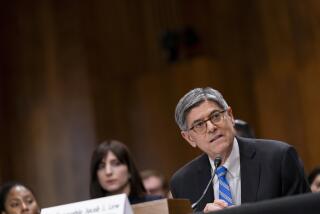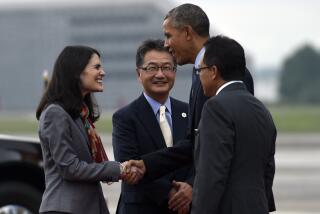Bush Names Special Envoy for Human Rights in N. Korea
- Share via
WASHINGTON — President Bush announced the appointment Friday of a former White House advisor as special envoy for human rights in North Korea, a move that offers the potential for rare direct talks between the two countries.
Washington lawyer Jay Lefkowitz provided advice on issues such as healthcare, stem cell research and litigation overhaul to Bush during the president’s first term. Lefkowitz fills a post mandated by the North Korean Human Rights Act passed by Congress last year.
Lefkowitz has been allotted a $2-million budget and is expected to focus initially on coordinating international efforts to heighten global awareness of the human rights problems in North Korea, a senior administration official said Friday.
The official indicated that direct contact with the North Korean regime on the issue was unlikely in the near future, but he stressed that Lefkowitz would have the authority to hold such talks. “It is intended that he have that capacity,” the official said. “But it takes two to talk.”
Lefkowitz was not immediately available for comment.
The official, who requested anonymity because he did not want to draw attention away from Lefkowitz, said he expected the envoy to take up his duties early next month by meeting with human rights officials from other nations, including those from East Asia, as well as members of nongovernmental organizations engaged in promoting human rights.
The United States does not have diplomatic relations with North Korea, and the Bush administration has resisted one-on-one contact with the regime even as Washington tries to persuade North Korean leader Kim Jong Il to give up a nuclear weapons program.
Instead, the U.S. has preferred to include four other nations -- China, Russia, Japan and South Korea -- in what have become known as six-party talks.
North Korea is widely considered to have one of the world’s worst human rights records, although activists note the country is so closed that it is difficult to determine the precise extent of abuses.
“There is no country in the world that denies fundamental freedoms to a greater extent than North Korea,” said Tom Malinowski of Human Rights Watch.
Although the job is required by Congress and is not a presidential initiative, the administration official briefing reporters Friday said it was strongly backed by Bush.
“The fact he’s picked someone like Jay shows the importance the president places on it,” the official said.
Lefkowitz is described as someone who has gained the trust of both the president and his father, George H.W. Bush, but his government background includes only a brief involvement in human rights issues. At one point, he served as a member of the U.S. delegation to the United Nations Human Rights Commission in Geneva. He does not appear to be well known among American rights specialists.
Administration officials stressed that Lefkowitz’s appointment was not linked to the six-party talks. Those negotiations, which recessed this month, are scheduled to resume in two weeks. North Korea is extremely sensitive to allegations about its human rights record, and Lefkowitz’s appointment, coming during a break in negotiations, seemed to some observers to be timed to avoid provoking the regime.
“There was consideration to do this before the last round [of talks] began, but that wasn’t a great idea,” said Alan D. Romberg, a former principal deputy director of the State Department’s policy planning staff during the Clinton administration and an expert on Asian affairs. “If the [North Koreans] want to seize on this as reason not to come back to the talks, they can do so, but they could also just denounce it as another example of hostile U.S. attitudes and still come back.”
Regardless of the effect of Lefkowitz’s appointment on the nuclear talks, his goal of coordinating efforts in the human rights field probably won’t be easy, rights advocates said. The administration’s unbending stance toward North Korea during Bush’s first term has caused foreign human rights workers to view any initiative by the president with suspicion.
For example, Malinowski of Human Rights Watch said that South Korean rights groups opposed the legislation that created Lefkowitz’s job, viewing it as little more than a smokescreen for a more aggressive U.S. policy toward North Korea.
“It’s going to be a very, very difficult challenge for anyone to be effective in this job,” he said.
More to Read
Sign up for Essential California
The most important California stories and recommendations in your inbox every morning.
You may occasionally receive promotional content from the Los Angeles Times.













